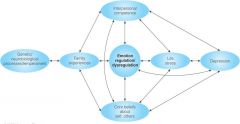![]()
![]()
![]()
Use LEFT and RIGHT arrow keys to navigate between flashcards;
Use UP and DOWN arrow keys to flip the card;
H to show hint;
A reads text to speech;
32 Cards in this Set
- Front
- Back
|
Mania
|
an abnormally elevated mood
|
|
|
euphoria
|
exaggerated sense of well-being
|
|
|
Depressive ruminative style
|
focus narrowly on negative events for long periods
|
|
|
depressogenic cognitions
|
Negative perceptual and attributional styles and beliefs associated with depressive symptoms
|
|
|
hopelessness theory
|
depression prone individuals tend to make internal, stable, and global attributions to explain the causes of negative events
|
|
|
negative cognitive triad (3)
|
-negative views about oneself
-negative views about the world -negative views about the future |
|
|
Negative cognitive schemata
|
stable structures in memory that guide information processing, including self-critical beliefs and attitudes. These are rigid and resistant to change
|
|
|
Diathesis-Stress Model
|
Depression can be a direct reaction to the occurence of stress-ful life events. Second the impact of stress may be moderated by individual risk factors such a genetic risk
|
|
|
Anhedonia
|
a loss of interest in nearly all activities and little joy is felt in anything
|
|
|
dysphoria
|
prolonged bouts of sadness
|
|
|
Mood Disorder
|
Any psychological disorder in which a disturbance in mood is the central feature
|
|
|
MDD
|
Sadness and loss of pleasure and irritability lasting at least 2 weeks
|
|
|
DD
|
Symptoms of lasting for 1 year or longer with somatic symptoms
|
|
|
BD
|
Periods of unusually elevated, euphoric or irritable mood alternating with one or more depressive episodes
|
|
|
Depression and Development in Infants
|
passive and unresponsive; stunted growth; irritable; delays in development
|
|
|
Depression and Development in School age
|
argumentative and combative; anhedonia; fatigue; express sadness
|
|
|
Depression and Development in Preschooler
|
withdrawn and inhibited; tired; motor retardation; weight loss; express sadness
|
|
|
Depression and Development in Teen
|
guilt and hopelessness; rage; low self-esteem; suicidality
|
|
|
Depression Symptom
|
feelings of sadness, they are temporary and by themselves do not indicate a problem
|
|
|
Syndrome
|
a group of depression symptoms occurring more often than chance would allow, can occur following certain life events like loss
|
|
|
Disorder
|
When a group of symptoms are accompanied by sleep disturbances, hopelessness or somatic complaints and persist over a period of 2 weeks (MDD) to 1 year (DD)
|
|
|
Major Depressive Disorder (MDD)
|
In order to meet the criteria for MDD the client must have experienced one major depressive episode (episodic MDD) or two or more (recurrent MDD)
with NO manic episode & no better accounted for diagnosis |
|
|
DSM criteria for MDD in children
|
Note: In children and adolescents, can be irritable mood.
Note: In children, consider failure to make expected weight gains. |
|
|
Child Onset MDD and Expected Outcomes
|
Children diagnosed with MDD are more likely to be diagnosed with Bipolar Disorder later on
Early onset MDD is harder to treat than the adult version Early onset MDD typically is a diagnosis of episodic MDD but will usually develop into the recurrent form |
|
|
MDD Comorbitidy and Prevalence
|
90% of kids with MDD with have a co-occurring disorder
anxiety disorders dysthymia conduct problems ADHD substance use disorder |
|
|
Dysthymic Disorder (DD)
|
Chronic, depressed mood, most of the day, most days, for at least 1 year
Usually fewer and less serious symptoms than depression |
|
|
DSM Criteria for Dysthmia
|
A) Depressed mood for most of the day, more days than not, for at least 2 years. (In children and adolescents, the mood may be irritable, and the duration of the condition must be for 1 year or more.)
|
|
|
Double Depression
|
Occurs when a child with diagnosed dysthymia experiences a major depressive episode
|
|
|
Associated Characteristics of Depressive Disorders
|
Academic problems, cognitive disturbances, unstable self-esteem, social difficulties, poor relations
|
|
|
Cognitive theory of depression
|
“Depressogenic” cognitions
depression-prone individuals tend to make internal, stable, and global attributions for the cause of negative events (opposite for positive) |
|
|
Beck’s cognitive model:
|
negative automatic thoughts
negative outlook regarding oneself, the world, and the future (“cognitive triad”) negative cognitive schemata (e.g., self critical) |
|

Common Components of Cognitive-Behavioral Treatment (CBT)
|
Self-monitoring
Challenging automatic thoughts Cognitive restructuring Self-reinforcement Activity scheduling Realistic goal setting |

